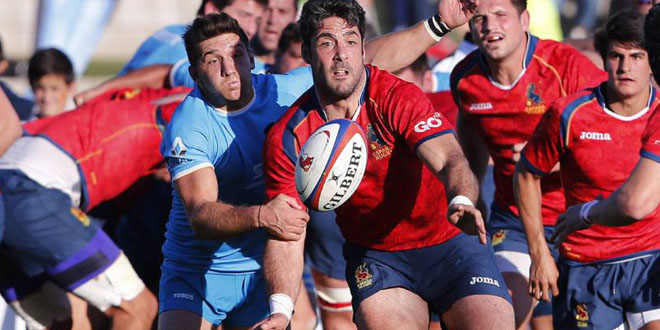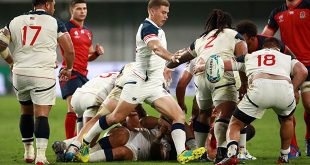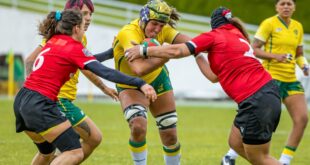Belgium, Romania, and Spain are out. That is what we were effectively informed when World Rugby released the findings of the independent Judicial and Disputes Committee into the eligibility breaches during the Rugby Europe Championship. Given all three had been found guilty of fielding ineligible players in matches that doubled as World Cup Qualifiers, this seemed a predictable outcome particularly in light of the recent precedent set in the Tahiti case.
Also investigated by the Committee was the circumstances surrounding the Belgium vs Spain match in Brussels that descended into chaos before it had even kicked off and became cataclysmic at the final whistle. World Rugby had opined that the match should be replayed, but the Committee did not agree, seemingly deciding that anything short of outright corruption was insufficient to declare the result void.
Whether that was the correct decision fundamentally or legally requires a lengthy discussion, but there are at least some holes in their reasoning. The suggestion that the match would carry the same weight as one played earlier in the Championship is accurate only in consideration of a spreadsheet. Similarly the comparison of the match to an average Six Nations contest is not logical.
While they acknowledge the ‘mathematics of the qualification process’ they do not take into account that the context of the match itself had changed as a result of that process. It was no longer merely another game with bonus points on offer, this was effectively a straight knock-out with the possibility of Spain reaching the World Cup for the first time in 20 years.
Rugby – all sport really – is at least as much psychological as it is physical and the failure to acknowledge that in the decision if baffling. If it was precedent they were after, the very Six Nations they were citing had removed a match official for ‘appearance of bias’ just days before. Ben Cisneros has written a strong piece about relevant legal precedents that is worth reading.
An utterly infuriating revelation from the document is that when Spain requested that the match officials for the match be changed, a Rugby Europe official simply dialed up the referee – Vlad Iordachescu – who said that ‘he was still content to referee the match.’ A much-loved Disney character might be used to describe this operation.
All this is not to suggest that their outcome was incorrect. In fact it’s probably best to accept that the ship has sailed on this particular point, and the match will not be replayed. Far more important are the eligibility issues that will ultimately determine who is in and who is not, if they have not already done so.
The fate of Belgium is cut and dry. They simply did not understand the eligibility regulations and somehow thought that the birthplace of a great grandparent would be enough to qualify five players. This is not and has never been accepted. Thankfully their passage in the Qualifiers had already been decided on the pitch and their sentence is effectively an administrative penalty and suspended fine, though their place in the Championship may now be in jeopardy next season.
Romania will appeal their sentence but one does wonder on what grounds. They will argue that they acted in good faith – that much is true – and did their due diligence, but did they?
The mix-up seems to be none or at least some of the Romanian Union (FRR), the Tongan Union (TRU), and Sione Faka’osilea were aware that senior sevens appearances counted towards international fifteen-a-side competition. The FRR claimed they had explained Regulation 8 to Faka’osilea but it seems likely that it was either lost in translation or was simply stated as ‘Senior or Next Senior’ teams, and not specifically sevens. Assuming that the player and the TRU would understand the regulations themselves was evidently a reckless hypothesis.
It might be said that Spain’s selection of Mathieu Bélie and Bastien Fuster fall under the same category and should therefore be treated equally. The judgement has clearly accepted this very letter-of-the-law approach and handed out the same sentence, but the similarities in between the two situations end at the Regulation itself.
Returning to Romania for a moment, the simple fact is that sevens appearances have always been considered ‘binding’ and continue to be today. The same cannot be said for age grade appearances, however, which had not been binding prior to 2007 and are not today.
A key difference between Romania’s case and that of Spain is that the latter was fully aware that the players in question had represented France u20. Their crime was not ignorance of the regulations but rather one of interpretation. Despite playing for a designated ‘Next Senior’ side the players were not informed that they had been captured and indeed the French Union (FFR) agreed that they were free to play for Spain and should therefore be considered eligible. At least that’s what the Spanish Union (FER) should have argued.
According to the Committee’s judgement, however, the primary defense from the FER was the citation of a little-known stipulation in Regulation 8 Explanatory Guideline 6 that required nominated ‘Next Senior’ sides to remain for a period of four years.
“The team nominated remains the Union’s next fifteen-a-side senior National Representative Team for a period of 4 years.”
Few would have ever heard of this as it had been removed from Guideline 6 in 2013.
This was a cheeky bit of business from the FER and their argument that the interpretation should be literal given that their offense was being treated in the strictest fashion similarly crafty. The Committee even went so far as to recognize the ‘skill’ of the FER’s challenge only to side with World Rugby’s explanation that an unwritten amendment of the ‘true meaning’ of Guideline 6 should be considered valid.
The FER’s riposte in this instance did not immediately find its mark but it may well have strengthened an appeal unintentionally. How so requires further explanation and a clear understanding of the context in which the regulations are being enforced.
Senior ‘A’ sides have long been used as stepping stones to full international honors though in recent years they have fallen out of fashion at the Tier 1 level. Up until 2003 only ‘A’ sides were considered binding but when Wales folded their ‘A’ side in a cost-saving move in 2004, they changed their nominated ‘Next Senior’ side to Wales u21.
Of course in order for a match to ‘capture’ a player the nominated ‘Next Senior’ side must be playing against another ‘Next Senior’ or Senior side. Given that from 2004 to 2006 Wales were the only nation to nominate their age-grade side as their ‘Next Senior team, it’s easily deduced that there were zero age-grade matches that captured eligibility until 2007, when France followed suit and nominated their u21 side as ‘Next Senior’.
During 2008 – the year Bélie was ‘captured’ by France – only two games at u20 level across the globe were considered binding. The Six Nations u20 contest between Wales and France, and the IRB Junior World Championship match between the same two sides. In 2007, only the Six Nations u21 match between Wales and France was binding. It could then be said that Bélie played in only the second and third matches ever that were considered binding at age-grade level, and the first two at u20 level.
In 2009 France ‘A’ returned and once again there were zero age-grade games that captured players until 2011, when France u20 was again nominated. In 2012, when Fuster was captured by France, South Africa somehow succeeded in altering their nomination mid-year to their u20 side just in time for the IRB Junior World Championship.
All told there were only five four age-grade matches between 2007 and 2012 that were considered binding, all contested between France and Wales.
2007-02-23 – France u21 vs Wales u21 (6N)
2008-03-14 – Wales u20 vs France u20 (6N)
2008-06-14 – Wales u20 vs France u20 (JWC)
2011-03-18 – France u20 vs Wales u20 (6N)
2012-03-16 – Wales u20 vs France u20 (6N)
[EDIT: As it turns out, the match in 2007 was actually France u21 vs Wales u20, meaning the match was not considered binding. Another confusing and inconsistent situation.]
No other age grade matches for France during that time were considered binding. From 2007 to 2012 France played 55 games at u21 or u20 level between the Six Nations and IRB Junior World Championships, of which only the above five four were binding.
It’s also worth noting that during the same time numerous u20 players from other nations have gone on to represent a different country at senior international level.
Six of New Zealand’s u20 roster at the 2008 Junior World Championship have since been capped by other nations: Rodney Ah You (Ireland), Paea Fa’anunu (Tonga), Sean Maitland and Grayson Hart (Scotland), Toby Smith and Mike Harris (Australia). Two more are set to earn their test debuts in the Pacific Nations Cup next month – Nasi Manu for Tonga and Mathew Luamanu for Samoa.
Samuela Vunisa played for Fiji in that tournament and has since been capped by Italy. Bélie started at flyhalf against Australia, a side that contained future Flying Fijian Nemani Nadolo and a pair of Manu Samoa caps, Seilala Lam and Jeremy Su’a. Tonga second row Steve Mafi was also in that squad as was Albert Anae, named in two senior Samoan squads though injury denied him a chance to be capped.
Fuster made the cut for France’s u20s for the 2012 Junior World Championship. From that touranment England’s Tom Heathcote would go on to play for Scotland, as would New Zealand flanker Hugh Blake. Fijian centre Samu Kerevi is now a fixture in Australia’s midfield. New Zealand’s Ope Peleseuma won a cap for Samoa in 2016, and Tommaso Allan left Scotland behind to play for Italy.
Allan Dell and Braam Steyn played for the first ever South African u20 side designated as ‘Next Senior’. The ‘Baby Boks’ did not play against France or Wales at the tournament, however, and the two players have since been snapped up by Scotland and Italy respectively.
All this is to say that if the Committee’s decision to overlook the four-year nomination cycle based on ‘common sense’ or ‘rugby sense’, it might also be reasonable to assert that neither Bélie nor Fuster were aware that representing France at u20 level might capture their future eligibility given the plethora of their international peers who have since switched teams and the extreme infrequency of ‘capture’ games played at age grade level.
Indeed it seems entirely unreasonable to assume that Bélie or Fuster would have even thought to check on that fact given 1) the prior existence of France ‘A’ and 2) the fact that Wales were the only other team in the world to nominate their u20s as a capture team.
In Bélie’s case not only did France ‘A’ exist before France u20 was nominated, they also existed immediately after. It’s entirely reasonable to consider that France ‘A’ was only on sabbatical, not dissolved entirely. The Committee points out that the four-year nomination cycle wouldn’t apply to a team whose ‘Next Senior’ side ceased to exist, and yet the Junior All Blacks have not played a single game since 2009 and remain New Zealand’s nominated ‘Next Senior’ side. Australia ‘A’ was scrapped in 2008, but they also declined to switch their nominated team to the u20s.
If we accept that the players themselves had no reason to assume they were being captured for the match they were taking part in, surely the onus to inform them then falls on the Union itself. To that extent the FFR have – according to the FER – admitted that the players were never informed, and indeed it seems likely the coaches themselves were also unaware of this administrative activity.
The FER insists that written declarations from the FFR had been submitted to the Committee stating that the players were never informed that they had been captured. This comes as a complete surprise to those who had only read the judgement itself as there is absolutely no mention of it in the Committee’s decision. This is an astonishing detail and must surely be held to account, particularly given that Romania’s attempt to contact Tonga had been included as supporting evidence of acting in good faith.
There are two previous eligibility cases that make this ‘failure to inform’ fact relevant. The first was in 2011 when two Wales u20 players – Matthew Jarvis and James Loxton – were signed by Connacht on the basis that they had not been captured and were also eligible to represent Ireland via ancestry. The Welsh Union (WRU) attempted to block the move, claiming that they were tied to Wales having represented the u20s when they were nominated as ‘Next Senior’ side in 2010.
A point made at the time was that Taulupe (Toby) Faletau had been informed that playing for the team would capture his eligibility but neither Jarvis nor Loxton were. At the heart of the confusion was that it was unclear whether France u20 or France ‘A’ was the ‘Next Senior’ side during the match in question.
Eventually it was confirmed that France ‘A’ were the capture team that year and the players were free to join Connacht and represent Ireland, but there are two important details here. The first is that even the administrators didn’t seem to know which French team had been nominated and the second that the requirement to inform the players was deemed relevant.
More important, however, is the Steve Shingler case from the following year. Shingler had appeared for Wales u20 against France u20 in 2011, a year in which both teams were designated ‘Next Senior’ sides. He was then selected for a Scotland senior training squad in 2012 but the WRU stepped in once again. This time their appeal was successful and Shingler was ruled ineligible for Scotland.
Of note is that the WRU was able to prove that they had informed Shingler that playing in the match would capture his eligibility. How much weight was that fact given? When queried a week ago, World Rugby was unable to produce the official judgement document. A summary is available online, however, and it includes as follows:
“The Panel noted that, in accordance with IRB Regulation 8, playing in a designated capturing match was the key determining factor with regard to the player’s eligibility. In this respect the Panel accepted the evidence of the Welsh Rugby Union that although Shingler had not signed the Union eligibility confirmation form he had been fully advised by the WRU that playing in the France Under 20 v Wales Under 20 match during the 2011 Under 20 Six Nations would capture him for Wales.”
From this wording it certainly appears that the WRU’s act of informing Shingler played a considerable part in their decision. If that is indeed the case, then surely Spain have legitimate grounds to appeal what appears to be a very harsh decision based on incomplete or miscommunicated information.
Exacerbating the current problem is the lack of a standardized process to ascertain eligibility, an issue admitted by the Committee itself in the judgement.
“World Rugby might want to consider whether to maintain a database showing players who have been captured by Unions.”
In fact Explanatory Guideline 20 of Regulation 8 states as follows:
“Each Union must nofity World Rugby of the names of all Players selected for its senior and next senior National Representative Team and its Senior National Representative Sevens Team on an annual basis. World Rugby shall maintain a database of all such Players.”
How can World Rugby expect its members to follow its regulations with ‘strict liability’ given their own inability to provide the very mechanism that would allow them to do so?
It’s clear that the ability to nominate a national age-grade side as ‘Next Senior’ was an error from day one and to World Rugby’s credit they have moved to correct it by no longer allowing u20 sides to be nominated as of last year. That in itself is an admission that the system was badly flawed.
If today’s u20s cannot be captured and the vast majority of yesterday’s are free, the logical solution would be to release all u20s captured previously. Are World Rugby really prepared to sacrifice the progress of a member union for the sake of an outdated policy that was universally panned?
Ireland are chuffed to have CJ Stander, a former South Africa u20 captain, and Eddie Jones is smiling as Brad Shields arrives in England, a New Zealand age-grade international and twice a member of All Blacks practice squads. Meanwhile Spain are being thrown out of the World Cup for daring to pick a French player who shared the pitch with some Welsh teenagers in 2008. Rugby deserves better.
 Americas Rugby News Rugby news from across the Americas!
Americas Rugby News Rugby news from across the Americas!




